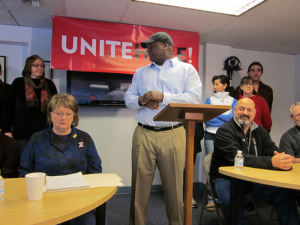
Anchorage hotel workers are celebrating after a federal judge issued a preliminary injunction against Remington Hospitality, the Texas-based operator of the city’s Sheraton Hotel. The injunction comes after a three-year legal battle. It requires the Sheraton take steps to restore the terms and conditions of employment as they existed prior to the hotel’s decision to stop union negotiations in 2009. Fay Gavin, a banquet server with 24 years with the Sheraton says she joined the lawsuit after management started doing things like cutting lunch breaks, increasing workload and giving away hours to temp workers. The injunction, she says, is a step in the right direction.
“With this injunction we’re going to get our seniority back. With seniority, hopefully some of us will have an income again. And then down the road, the fired employees will be coming back, we hope to get back and get a contract, a fair contract and have respect again,” Gavin said.
A federal judge issued the injunction against Remington on Feb. 3. In a statement to APRN, Remington Lodging and Hospitality attorney Karl Terrell said the group planned to appeal the injunction. The union claims that over 30 unfair labor practice charges are still pending against the Anchorage Sheraton. Local 878 represents over 1,400 hospitality workers across the state of Alaska.
Daysha Eaton is a contributor with the Alaska Public Radio Network.
Daysha Eaton holds a B.A. from Evergreen State College, and a M.A. from the University of Southern California. Daysha got her start in radio at Seattle public radio stations, KPLU and KUOW. Before coming to KBBI, she was the News Director at KYUK in Bethel. She has also worked as the Southcentral Reporter for KSKA in Anchorage.
Daysha's work has appeared on NPR's "Morning Edition" and "All Things Considered", PRI's "The World" and "National Native News". She's happy to take assignments, and to get news tips, which are best sent via email.
Daysha became a journalist because she believes in the power of storytelling. Stories connect us and they help us make sense of our world. They shed light on injustice and they comfort us in troubled times. She got into public broadcasting because it seems to fulfill the intention of the 4th Estate and to most effectively apply the freedom of the press granted to us through the Constitution. She feels that public radio has a special way of moving people emotionally through sound, taking them to remote places, introducing them to people they would not otherwise meet and compelling them to think about issues they might ordinarily overlook.




